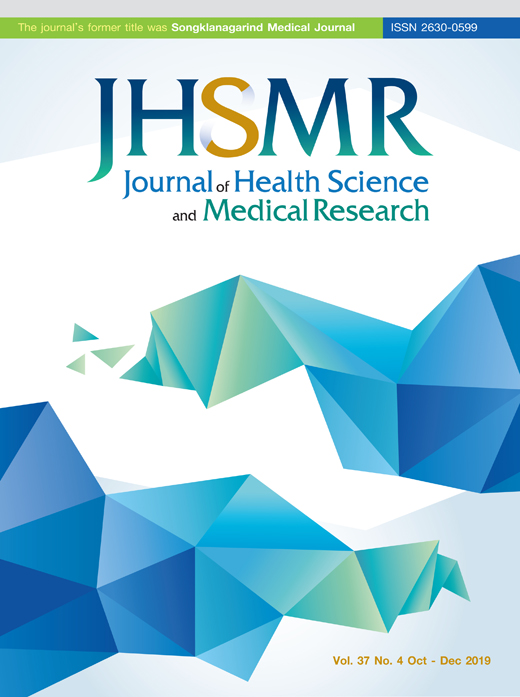A Comparison Study of the Auditory P300 Results of Elderly Patients with Sensorineural Hearing Loss
DOI:
https://doi.org/10.31584/jhsmr.201964Keywords:
auditory P300 response, cognitive ability, elderly, hearing aid, sensorineural hearing lossAbstract
Objective: The purpose of this study was to compare the auditory P300 results of elderly patients with sensorineural hearing loss (SNHL) before and after hearing aid use.
Material and Methods: A cross-sectional study was conducted from July, 2016 to April, 2017 at the Hearing Aid Clinic of Ramathibodi Hospital. Twenty-six elderly patients aged ≥60 with bilateral symmetrical SNHL who were referred for unilateral hearing aid fitting by otolaryngologist were included. The auditory P300 was recorded before and 2 months after hearing aid fitting.
Results: The P300 waveforms, with a mean latency of 374.48 milliseconds and mean amplitude of 6.68 microvolts (µV), could be recorded in only 21 participants. At 2 months after hearing aid use, the mean P3 latency was 376.83 ms and mean amplitude was 8.77 µV. There was a statistically significant difference in amplitude of P300 2 months after hearing aid fitting (p-value=0.004).
Conclusion: The auditory P300 results indicate an improvement in cognitive ability with higher amplitude. Thus, the P300 may be used to evaluate improvements in cognitive function after using a hearing aid. It can also be used as a guideline for explaining the benefits of hearing aid use to patients who initially rejected a hearing aid.
References
2. Lin FR. Hearing loss and cognition among older adults in the United States. J Gerontol A Biol Sci Med Sci 2011;66:1131-6.
3. Wong LL, Yu JK, Chan SS, Tong MC. Screening of cognitive function and hearing impairment in older adults: a preliminary study. Biomed Res Int 2014;2014:867852.
4. Dalton DS, Cruickshanks KJ, Klein BE, Klein R, Wiley TL, Nondahl DM. The impact of hearing loss on quality of life in older adults. Gerontologist 2003;43:661-8.
5. Barrios H, Narciso S, Guerreiro M, Maroco J, Logsdon R, de Mendonca A. Quality of life in patients with mild cognitive impairment. Aging Ment Health 2013;17:287-92.
6. Acar B, Yurekli MF, Babademez MA, Karabulut H, Karasen RM. Effects of hearing aids on cognitive functions and depressive signs in elderly people. Arch Gerontol Geriatr 2011;52:250-2.
7. Weinstein BE. Geriatric audiology. 2nd ed. New York: Thieme;2012.
8. Mulrow CD, Aguilar C, Endicott JE, Tuley MR, Velez R, Charlip WS, et al. Quality-of-life changes and hearing impairment. A randomized trial. Ann Intern Med 1990;113:188-94.
9. Mantello EB, Silva CD, Massuda ET, Hyppolito MA, Reis A. Relationship between speech perception and level of satisfaction of hearing aid users. Int Arch Otorhinolaryngol 2016;20:315-20.
10. Chang CYJ, Spearman M, Spearman B, McCraney A, Glasscock ME. Comparison of an electromagnetic middle ear implant and hearing aid word recognition performance to word recognition performance obtained under earphones. Otol Neurotol 2017;38:1308-14.
11. Martyn SW. Research bias [homepage on the Internet]. Explorable; 2009 [cited 2019 Aug 24]. Available from: https://explorable.com/research-bias
12. Davis H. Enhancement of evoked cortical potentials in humans related to a task requiring a decision. Science 1964;145:182-3.
13. Sutton S, Braren M, Zubin J, John ER. Evoked-potential correlates of stimulus uncertainty. Science 1965;150:1187-8.
14. Coser MJ, Coser PL, Pedroso FS, Rigon R, Cioqueta E. P300 auditory evoked potential latency in elderly. Braz J Otorhino laryngol 2010;76:287-93.
15. Polich J. P300 clinical utility and control of variability. J Clin Neurophysiol 1998;15:14-33.
16. Polich J. Attention, probability, and task demands as determinants of P300 latency from auditory stimuli. Electroencephalogr Clin Neurophysiol 1986;63:251-9.
17. Picton TW. The P300 wave of the human event-related potential. J Clin Neurophysiol 1992;9:456-79.
18. Picton TW, Bentin S, Berg P, Donchin E, Hillyard SA, Johnson R Jr, et al. Guidelines for using human event-related potentials to study cognition: recording standards and publication criteria. Psychophysiology 2000;37:127-52.
19. Hall JW. New handbook of auditory evoked responses: Pearson; 2007. 20. Polich J. Updating P300: an integrative theory of P3a and P3b. Clin Neurophysiol 2007;118:2128-48.
21. Duarte JL, Alvarenga KdF, Banhara MR, de Melo ADP, Sás RM, Filho OAC. P300- long-latency auditory evoked potential in normal hearing subjects: simultaneous recording value in Fz and Cz. Braz J Otorhinolaryngol 2009;75:231-6.
22. Reis ACMB, Frizzo ACF, Isaac MdL, Garcia CFD, Funayama CAR, Iório MCM. P300 in individuals with sensorineural hearing loss. Braz J Otorhinolaryngol 2015;81:126-32.
23. Cramer SC, Sur M, Dobkin BH, O’Brien C, Sanger TD, Trojanowski JQ, et al. Harnessing neuroplasticity for clinical applications. Brain 2011;134:1591-609.
24. McCarthy G, Donchin E. A metric for thought: a comparison of P300 latency and reaction time. Science 1981;211:77-80.
25. Pfefferbaum A, Christensen C, Ford JM, Kopell BS. Apparent response incompatibility effects on P3 latency depend on the task. Electroencephalogr Clin Neurophysiol 1986;64:424 -37.
26. Leite RA, Magliaro FCL, Raimundo JC, Bento RF, Matas CG. Monitoring auditory cortical plasticity in hearing aid users with long latency auditory evoked potentials: a longitudinal study. Clinics (Sao Paulo) 2018;73:e51.
























